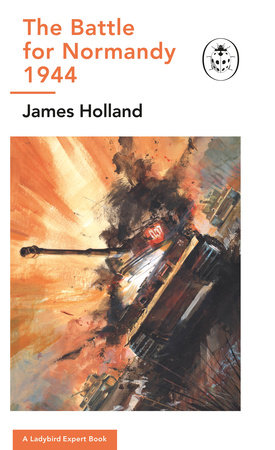In less than 60 days, we will commemorate the 80th anniversary of D-Day, the Allied landing in Normandy on June 6th, 1944. The celebrations surrounding that event are already under way. In the last hours, the French Ambassador to Canada travelled to Regina, the capital of Saskatchewan, to present the Légion d’honneur – France’s highest distinction established by Napoleon in 1802 – to a 104-year-old veteran who set foot on the beach on that fateful morning.
As we salute these men and prepare to sadly see the last ones depart for eternity, the need for remembrance becomes ever more crucial. Historians play an essential role on that score. Plenty of great books have been written about the longest day and the campaign that followed.
I just finished reading James Holland’s contribution to that impressive list, through the Ladybird Expert Book series. For anyone wanting to grasp the development of the Battle for Normandy in a summarized and vividly written style, this book is a must.
Evoking the different phases of the battle, James Holland explains that nothing was preordained with Operation Overlord. Even though the mine-clearing operation to reach the Normandy beaches was an astonishing success, “it remains a largely forgotten episode that deserves far greater recognition.” The Allies won “the battle of the build-up”, at the price of a ferocious German resistance. On top of that, “casualties among front-line [Allied] units were appalling.” With an acute sense of perspective, the author mentions that the “daily casualty rates” in Normandy was “on average, worse than for the Somme, Verdun and Passchendaele in the First World War.”
By August, German commanders realized the die was cast, a reality underscored by the fact that Field Marshal Erwin Rommel, the overall German commander in Normandy whose advice about how to respond to the invasion Hitler blatantly discarded, was incapacitated after being “badly wounded in an air attack”. Rommel’s disappearance from the theater plunged his subordinates and soldiers in further disarray.
As a huge fan of Monty (Field Marshal Bernard Montgomery), I also must admit that I particularly enjoyed the mention of his savviness in not sharing his doubts about Operation Goodwood – a British offensive during the Battle for Caen – because he wanted to make sure he would receive full air cover, something that might have been thwarted otherwise. Savvy warlord.
The rest, as the formula goes, belongs to the posterity of the Allied victory.
Tourists strolling nowadays the beaches where the heroes landed eight decades ago might not fully grasp the brutality of an operation whose success was only granted by huge sacrifices. Abandoned bunkers are only a shadow of what Macauley meant when he declared that “the essence of war is violence and moderation in war is imbecility.”
Thanks to authors like James Holland, the reader – whether he is a devoted military enthusiast or a commuter seeking to know more about that pivotal episode of World War II – can grasp why D-Day matters more than ever, in a time when the immoderate violence of war has invited itself again with renewed brutality over the last two years.
________
James Holland, The Battle for Normandy 1944, London, Michael Joseph (Penguin Random House), 2023, 56 pages.

